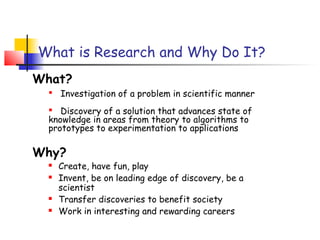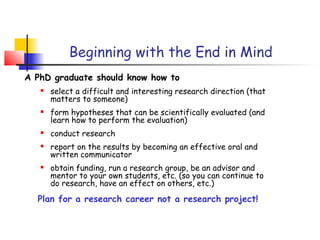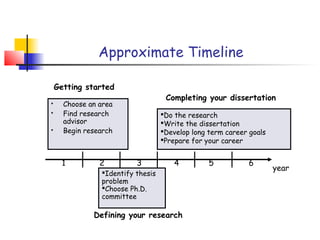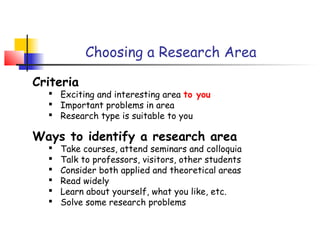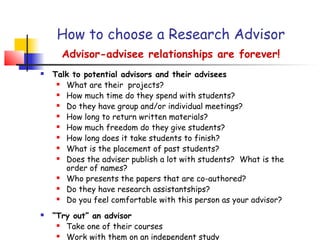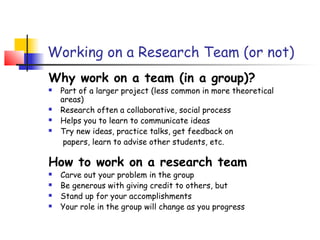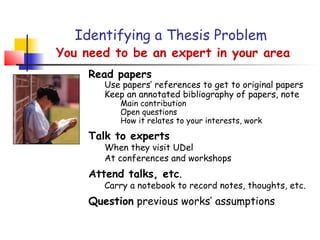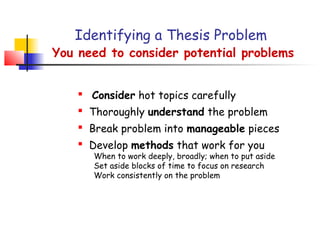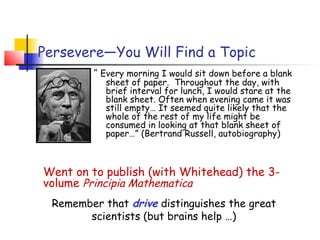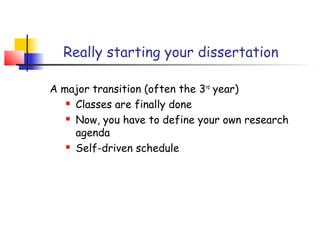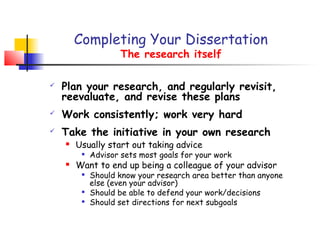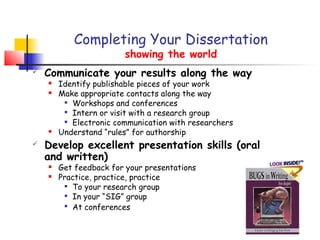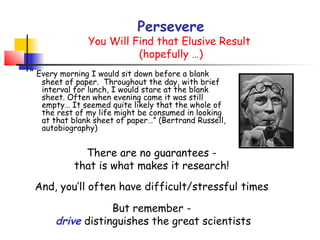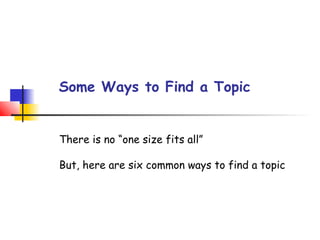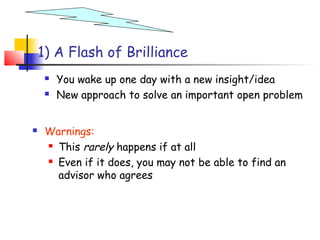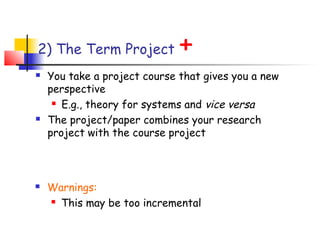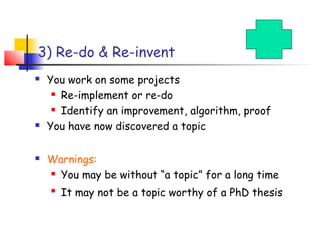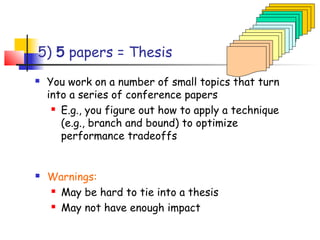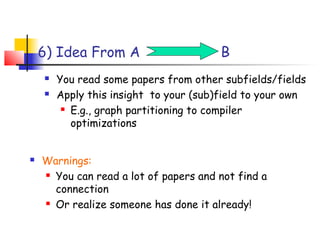Research
- 1. All About Research Adapted from presentations and slides by: M.J. Harrold - Georgia Institute of Technology O. Pearce - Texas A&M University M.L. Soffa - University of Virginia P. Raghavan - Penn State University F. Berman - UC San Diego The CRA-W Grad Cohort for Women Program
- 2. What is Research and Why Do It? What? ’é¦ Investigation of a problem in scientific manner ’é¦ Discovery of a solution that advances state of knowledge in areas from theory to algorithms to prototypes to experimentation to applications Why? ’ü« Create, have fun, play ’ü« Invent, be on leading edge of discovery, be a scientist ’ü« Transfer discoveries to benefit society ’ü« Work in interesting and rewarding careers
- 3. Beginning with the End in Mind A PhD graduate should know how to ’ü« select a difficult and interesting research direction (that matters to someone) ’ü« form hypotheses that can be scientifically evaluated (and learn how to perform the evaluation) ’ü« conduct research ’ü« report on the results by becoming an effective oral and written communicator ’ü« obtain funding, run a research group, be an advisor and mentor to your own students, etc. (so you can continue to do research, have an effect on others, etc.) Plan for a research career not a research project!
- 4. Approximate Timeline Getting started Completing your dissertation ’é¦ Choose an area ’é¦ Find research ’é¦Do the research advisor ’é¦Write the dissertation ’é¦ Begin research ’é¦Develop long term career goals ’é¦Prepare for your career 1 2 3 4 5 6 year ’é¦Identify thesis problem ’é¦Choose Ph.D. committee Defining your research
- 5. Choosing a Research Area Criteria ’é¦ Exciting and interesting area to you ’é¦ Important problems in area ’é¦ Research type is suitable to you Ways to identify a research area ’é¦ Take courses, attend seminars and colloquia ’é¦ Talk to professors, visitors, other students ’é¦ Consider both applied and theoretical areas ’é¦ Read widely ’é¦ Learn about yourself, what you like, etc. ’é¦ Solve some research problems
- 6. How to choose a Research Advisor Advisor-advisee relationships are forever! ’ü« Talk to potential advisors and their advisees ’ü« What are their projects? ’ü« How much time do they spend with students? ’ü« Do they have group and/or individual meetings? ’ü« How long to return written materials? ’ü« How much freedom do they give students? ’ü« How long does it take students to finish? ’ü« What is the placement of past students? ’ü« Does the adviser publish a lot with students? What is the order of names? ’ü« Who presents the papers that are co-authored? ’ü« Do they have research assistantships? ’ü« Do you feel comfortable with this person as your advisor? ’ü« ŌĆ£Try outŌĆØ an advisor ’ü« Take one of their courses ’ü« Work with them on an independent study
- 7. Working on a Research Team (or not) Why work on a team (in a group)? ’ü« Part of a larger project (less common in more theoretical areas) ’ü« Research often a collaborative, social process ’ü« Helps you to learn to communicate ideas ’ü« Try new ideas, practice talks, get feedback on papers, learn to advise other students, etc. How to work on a research team ’ü« Carve out your problem in the group ’ü« Be generous with giving credit to others, but ’ü« Stand up for your accomplishments ’ü« Your role in the group will change as you progress
- 8. Identifying a Thesis Problem You need to be an expert in your area Read papers Use papersŌĆÖ references to get to original papers Keep an annotated bibliography of papers, note Main contribution Open questions How it relates to your interests, work Talk to experts When they visit UDel At conferences and workshops Attend talks, etc. Carry a notebook to record notes, thoughts, etc. Question previous worksŌĆÖ assumptions
- 9. Identifying a Thesis Problem You need to consider potential problems ’é¦ Consider hot topics carefully ’é¦ Thoroughly understand the problem ’é¦ Break problem into manageable pieces ’é¦ Develop methods that work for you When to work deeply, broadly; when to put aside Set aside blocks of time to focus on research Work consistently on the problem
- 10. PersevereŌĆöYou Will Find a Topic ŌĆ£ Every morning I would sit down before a blank sheet of paper. Throughout the day, with brief interval for lunch, I would stare at the blank sheet. Often when evening came it was still emptyŌĆ” It seemed quite likely that the whole of the rest of my life might be consumed in looking at that blank sheet of paperŌĆ”ŌĆØ (Bertrand Russell, autobiography) Went on to publish (with Whitehead) the 3- volume Principia Mathematica Remember that drive distinguishes the great scientists (but brains help ŌĆ”)
- 11. Really starting your dissertation A major transition (often the 3rd year) ’ü« Classes are finally done ’ü« Now, you have to define your own research agenda ’ü« Self-driven schedule
- 12. Completing Your Dissertation The research itself ’ā╝ Plan your research, and regularly revisit, reevaluate, and revise these plans ’ā╝ Work consistently; work very hard ’ā╝ Take the initiative in your own research ’ü« Usually start out taking advice ’ü« Advisor sets most goals for your work ’ü« Want to end up being a colleague of your advisor ’ü« Should know your research area better than anyone else (even your advisor) ’ü« Should be able to defend your work/decisions ’ü« Should set directions for next subgoals
- 13. Completing Your Dissertation showing the world ’ā╝ Communicate your results along the way ’ü« Identify publishable pieces of your work ’ü« Make appropriate contacts along the way ’ü« Workshops and conferences ’ü« Intern or visit with a research group ’ü« Electronic communication with researchers ’ü« Understand ŌĆ£rulesŌĆØ for authorship ’ā╝ Develop excellent presentation skills (oral and written) ’ü« Get feedback for your presentations ’ü« Practice, practice, practice ’ü« To your research group ’ü« In your ŌĆ£SIGŌĆØ group ’ü« At conferences
- 14. Persevere You Will Find that Elusive Result (hopefully ŌĆ”) ŌĆ£ Every morning I would sit down before a blank sheet of paper. Throughout the day, with brief interval for lunch, I would stare at the blank sheet. Often when evening came it was still emptyŌĆ” It seemed quite likely that the whole of the rest of my life might be consumed in looking at that blank sheet of paperŌĆ”ŌĆØ (Bertrand Russell, autobiography) There are no guarantees - that is what makes it research! And, youŌĆÖll often have difficult/stressful times But remember - drive distinguishes the great scientists
- 15. Some Ways to Find a Topic There is no ŌĆ£one size fits allŌĆØ But, here are six common ways to find a topic
- 16. 1) A Flash of Brilliance ’ü« You wake up one day with a new insight/idea ’ü« New approach to solve an important open problem ’ü« Warnings: ’ü« This rarely happens if at all ’ü« Even if it does, you may not be able to find an advisor who agrees
- 17. 2) The Term Project + ’ü« You take a project course that gives you a new perspective ’ü« E.g., theory for systems and vice versa ’ü« The project/paper combines your research project with the course project ’ü« Warnings: ’ü« This may be too incremental
- 18. 3) Re-do & Re-invent ’ü« You work on some projects ’ü« Re-implement or re-do ’ü« Identify an improvement, algorithm, proof ’ü« You have now discovered a topic ’ü« Warnings: ’ü« You may be without ŌĆ£a topicŌĆØ for a long time ’ü« It may not be a topic worthy of a PhD thesis
- 19. 4) The Apprentice ’ü« Your advisor has a list of topics ’ü« Suggests one (or more!) that you can work on ’ü« Can save you a lot of time/anxiety ’ü« Warnings: ’ü« DonŌĆÖt work on something you find boring, badly-motivated,ŌĆ” ’ü« Several students may be working on the same/related problem
- 20. 5) 5 papers = Thesis ’ü« You work on a number of small topics that turn into a series of conference papers ’ü« E.g., you figure out how to apply a technique (e.g., branch and bound) to optimize performance tradeoffs ’ü« Warnings: ’ü« May be hard to tie into a thesis ’ü« May not have enough impact
- 21. 6) Idea From A B ’ü« You read some papers from other subfields/fields ’ü« Apply this insight to your (sub)field to your own ’ü« E.g., graph partitioning to compiler optimizations ’ü« Warnings: ’ü« You can read a lot of papers and not find a connection ’ü« Or realize someone has done it already!


